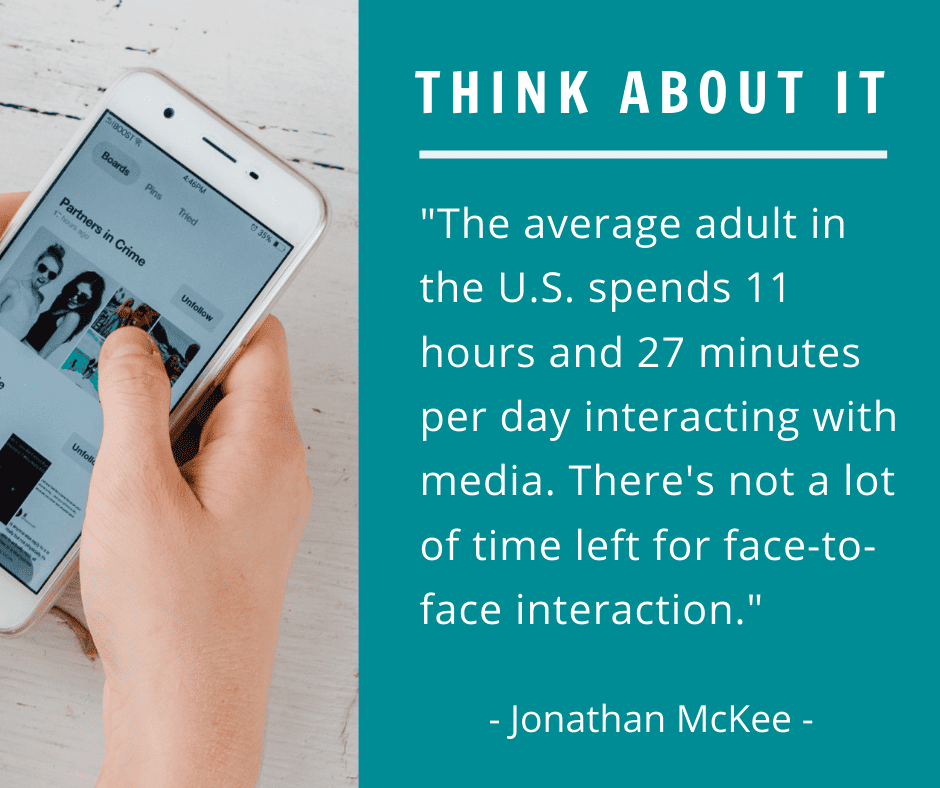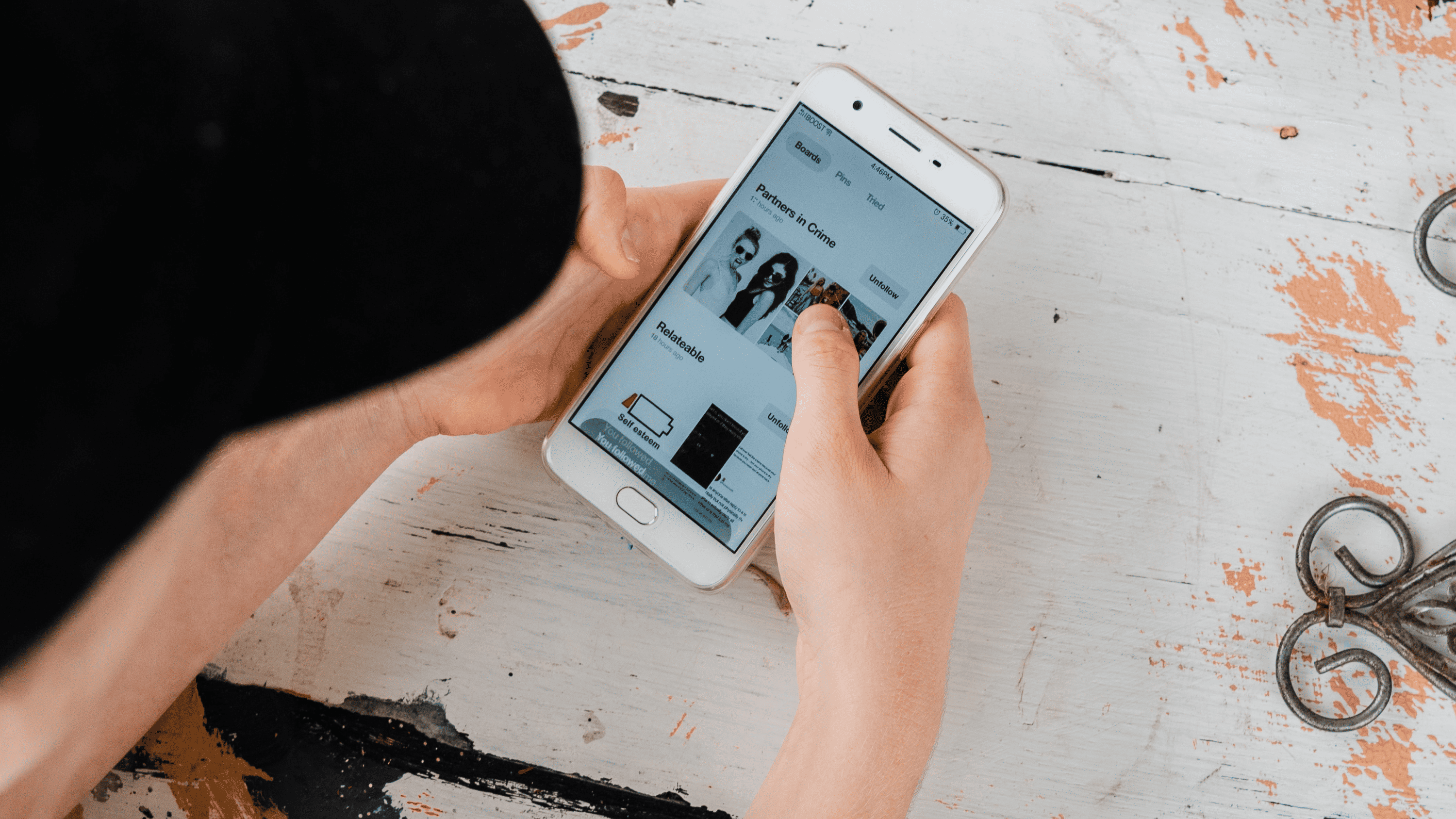It’s 10 p.m. The kids are asleep, so Brian and Emily turn off Netflix and head to the bedroom.
When they first got married, this was a time full of conversation … sometimes even a little flirting … as they brushed their teeth and crawled into their pajamas. But now the conversation is sparse. Brian multitasks, returning a few emails from his phone while brushing. Emily’s also engrossed in her phone. She hits thumbs-up to a text from her boss, then scrolls through her social media feed … again. (She checked it last 22 minutes ago while watching TV.)
The whole evening is different than it used to be. It has nothing to do with kids or just getting old … it’s something else.
Twenty-five years ago, Brian and Emily would do the dishes together while singing loudly (and a little off-key) to whatever new CD spun in the player. After dinner, they’d walk the dog, sit on the porch for a while and then turn on the TV.
But the interesting thing about TV back then, at least for Brian and Emily, was that they watched it together. When Kramer (of “Seinfeld” fame) did something funny, Brian and Emily would laugh together. Now, they have additional screens beckoning them during TV time. When Emily laughs, it’s at something on her screen.
“What?” Brian asks, not even looking up from his own phone.
“Nothing. Just a video someone posted from work.”
Brian nods. He isn’t really listening. Half of his attention is focused on the game on TV while he’s also checking his phone to see how his fantasy team did Monday night.
Brian and Emily rarely stare at the same screen anymore.
A short time later, as they slip into bed, each plugs their phones into a charger on their corresponding bedside.
“Good night, Baby.”
“Good night, Love.”
Brian will wake up in two hours and check his phone again … and will do so again a few hours later. And then, when each wakes up in the morning, the first thing they will do is check their phones.
Welcome to modern-day marriage.
The struggle with screen time
I wish I could tell you that this was an anomaly, but sadly, in a world where the average adult in the U.S. spends 11 hours and 27 minutes per day interacting with media, there’s not a lot of time left for face-to-face interaction. The fact is, most of us spend far more time staring at screens than we do with our spouse.
It’s not that screens are bad. Tech can be a lot of fun in a marriage: enjoying entertainment media together, reaching out to a loved one across the country or sharing a reading plan in a Bible app, commenting to each other about what we learned.
Screens can also enhance relationships. Ask the wife who’s home alone for nine months while her husband is deployed overseas. Praise God for FaceTime! Tech can be a huge benefit.
But it can also be a huge distraction.
Many of us might be quick to dismiss this realization. After all, it’s kids who let their phones become a distraction, not us … right?
Common Sense Media released a study about families and their devices revealing that 69% of parents feel their kids are distracted by their mobile devices more than once each day. But that same study revealed some interesting things about us — the adults in the home:
- 54% of parents feel distracted by their mobile device at least once a day
- 54% of parents feel they spend too much time on their mobile device
- 45% of parents feel addicted to their mobile device
So, is it too bold to point out that if half of us feel distracted by our mobile devices, admit we spend too much time on those devices and even feel addicted to those devices … chances are that one of the two of you in your marriage struggle with this?
Phones and social media can kill marriages
And does it surprise you that research reveals “excessive device usage decreased marital satisfaction”? You probably don’t need a psychologist to tell you that when two people spend increasingly less time together the relationship suffers.
Would it surprise you that Brian and Emily were actually my friends and they just got divorced?
Screens call literally kill a marriage.
I was speaking on the subject recently and a pastor’s wife approached me after my talk. I’ll never forget her words about her husband: “I despise his phone because I always feel like I’m competing with it. And his laptop. I hate his laptop.”
So how can we be careful to not let screens hurt our marriage? Let’s look at ways to avoid tech tearing your marriage in two:
Stop ‘phubbing’ your family
Have you ever been phubbed? Phubbing, or phone-snubbing, is when someone chooses their screen over you. You know, like when you’re trying to talk with your spouse and they’re scrolling through their social media feed, ignoring you?
I probably don’t need to show you research to tell you that this hurts your marriage (but I will).
A study in the Journal of Applied Social Psychology found that “phubbing significantly and negatively affected perceived communication quality and relationship satisfaction.”
Yes, frequenting Facebook over family forces fission. Your husband doesn’t like it when you choose Instagram over him. Your wife despises the fact that everyone else has more access to you than she does.
Baylor University published similar findings. Phubbing not only creates conflict, which makes couples dissatisfied in their relationship, but “These lower levels of relationship satisfaction led to lower levels of life satisfaction and, ultimately, higher levels of depression.”
Avoid phubbing your spouse
Try a few of these proactive practices:
- Finish texts and emails before you pull into your driveway. Stop at the gas station around the corner if you must. Make it so when you walk in the door your full attention is on your spouse.
- Talk with your spouse about phubbing. Identify it. Let your family know that you want to make them a priority. Model what it means to be phub-free.
- Create “tech-free zones” in your house or come up with tech-free rules like “no tech at the table.” Make dinner a time of face-to-face communication. That means you put devices away before coming to the table. Your work can do without you for 30 minutes.
- Consider taking an occasional break from tech, like “No-tech Tuesdays” or vacations where you completely unplug. Most couples find these rewarding, if not transforming!
- Pull phones from the bedrooms. Yes, this is difficult in a world where 84% of adults keep their phones in their bedroom at night, 72% within grasp. Phones tend to kill intimacy, so get that chastity belt out of your bedroom!
Nub phubbing before it becomes a catastrophic problem in your marriage and family.
Phones are great tools for connecting with people outside of the room when they don’t interfere with your relationships with the people inside the room. But let’s talk a bit about those people we connect with outside the room …

Flee Facebook flirting
Social media not only opens pathways to healthy connections with long-distance friends and family; but it can also unlock passageways to some unhealthy relationships.
It’s more common than you’d think. One spouse is feeling disconnected from the other but feels embraced and encouraged by an online “friend.” Social media sites like Facebook sometimes rekindle old relationships, even inappropriate ones. In addition, social media only provides a skewed view of people, usually when people look their best. Who posts a profile pic of them waking up first thing? (It’s hard for our spouse to compete with an edited photo.)
Be careful who you connect with. Divorce attorney James J. Sexton told Vox:
I can’t remember the last time I had a case where social media was not either a root cause or implicated in some way. And it’s always the same story: people maintaining affairs via social media or communicating with people they don’t have any business communicating with. Infidelity is so easy now, and it’s poisoning marriages.
Plain and simple, don’t engage in any conversations that you wouldn’t engage in if your spouse, your pastor … or Jesus … were sitting next to you.
My wife, Lori, and I have shared our phones with each other from day one. I have nothing to hide from her. We know each other’s passwords and even have our thumbprints saved to open each other’s phones. It’s not so we can check on each other. It’s honestly more convenience, like when we talk with our kids.
“Hey, did Alyssa text you?”
“Yeah, she was telling me about her new job. Grab my phone and look at the text trail.”
This availability and transparency provides accountability. I don’t mind if Lori looks at any of my social media. I don’t have any secret relationships.
But that’s not the only kind of secret activity to avoid …
Resist the pull of porn
Porn kills marriages, and with 96% of American adults owning a smartphone, porn is a bigger threat than ever before. Just how big?
Some research suggests 60% to 70% of men and 30% to 40% of women under the age of 40 use porn each year. And all this porn is destroying marriages. I know, because I’ve seen it firsthand.
I’ve had three friends whose spouses caught them using porn. Two of my friends didn’t stop at porn. They went on to affairs. Only one of the three is still married.
It’s not surprising. A 2018 study among married adults found that, overall, the chance of divorce doubled for both men and women who started using porn after getting married. Doubled!
It’s logical. When a woman comes home and catches her husband with another woman, it’s usually ugly. Is porn any different? Not to Jesus: “You have heard that it was said, ‘You shall not commit adultery.’ But I say to you that everyone who looks at a woman with lustful intent has already committed adultery with her in his heart” (Matthew 5:27-28).
Committed Christians tend to view less porn. “Porn in the Digital Age,” a report by Barna Group, shows that only 23% of committed Christian males over 25 years of age seek porn at least once a month, and only 5% of Christian females 25 or older do the same.
But one out of every four Christian males is a whole lot of marriages in the church.
So what can couples do to keep porn from tearing apart their marriage?
Keep porn from pulling your marriage apart
First, open up to communication about the temptation of porn. This means creating a climate of empathy so a struggling spouse feels safe to confess the need for help. If a spouse confesses to viewing pornography, the confession alone could most likely be a willingness to work on the problem. Always celebrate transparency and a willingness to change.
If you discover porn in your marriage, you’re not alone. A study by the Barna Group revealed 19% of all practicing Christians are “currently trying to stop using porn.” Don’t be afraid to seek counseling to work through it. Don’t just dismiss it, ignore it and hope it goes away — as my two divorced friends did.
If porn isn’t a problem in your marriage, make sure you’re proactive about avoiding porn triggers:
- Always try to go to bed at the same time as your spouse. Most porn users I know have confessed to me they view porn after their spouse goes to bed.
- Embrace transparency on all your devices.
- Seek accountability if porn is a temptation. Many churches have small groups or ministries that provide this kind of accountability. Look for same-gender groups where men encourage men and women encourage women. Or find accountability software.
- Avoid gateway shows that show sexually explicit scenes. As much as you like that TV show if it constantly includes softcore porn, it’s probably something you should skip. (How many people do you know who can watch softcore porn without lusting?)
Note what Scripture says
Proverbs 5 has never been more relevant as today:
Let your fountain be blessed, and rejoice in the wife of your youth, a lovely deer, a graceful doe. Let her breasts fill you at all times with delight; be intoxicated always in her love. Why should you be intoxicated, my son, with a forbidden woman and embrace the bosom of an adulteress?
God designed the marriage relationship so that a husband and wife enjoy each other’s bodies in a covenant relationship … where we don’t go outside that relationship for sexual satisfaction. Why be captivated by porn? The spouse you married is right there next to you!
If you are struggling with intimacy in your marriage seek counseling. Intimacy is a vital part of marriage that bonds two people, releases oxytocin and intrinsically connects them. Porn is an impotent substitute (with truly impotent results).
Decision time
Marriage has always struggled with intimacy-killers, from the polygamy of the Old Testament to the 21st century challenges of work, hobbies and busyness. In addition, technology has become a subtle, yet powerful, intimacy buster. In each of the examples I’ve listed, couples make the mistake of connecting more with technology and less with each other. Most of these couples aren’t looking for affairs, separation or divorce … but many find those things.
Are there some changes you might need to make with your screens?
I guess the big question many of us might want to ask is, “Does everyone else have more access to me than my spouse does?”
Your phone just vibrated.
Do you really have to look?




















